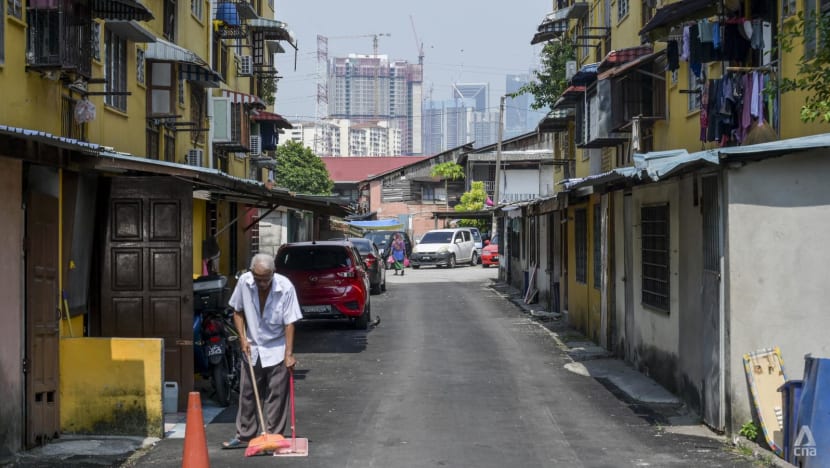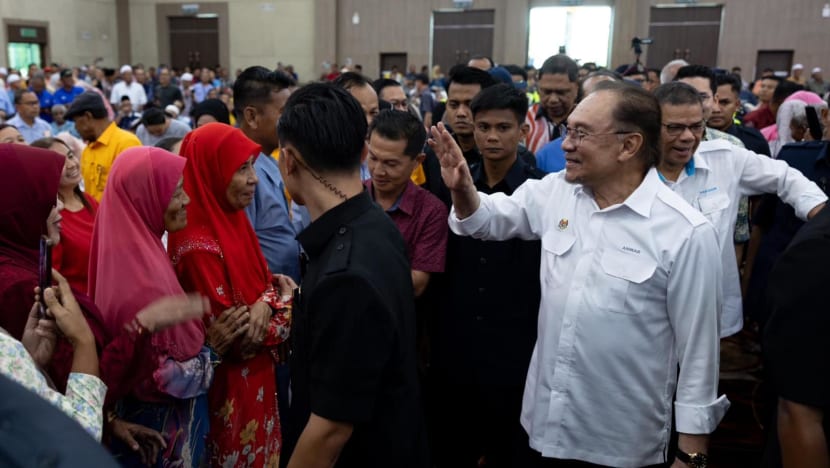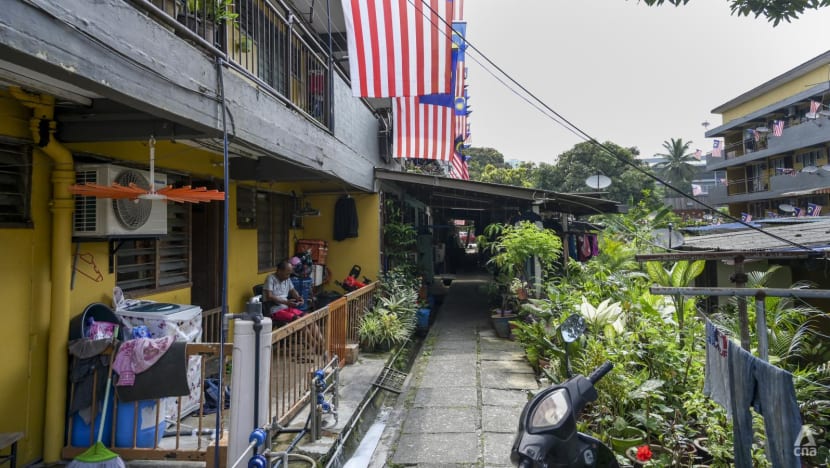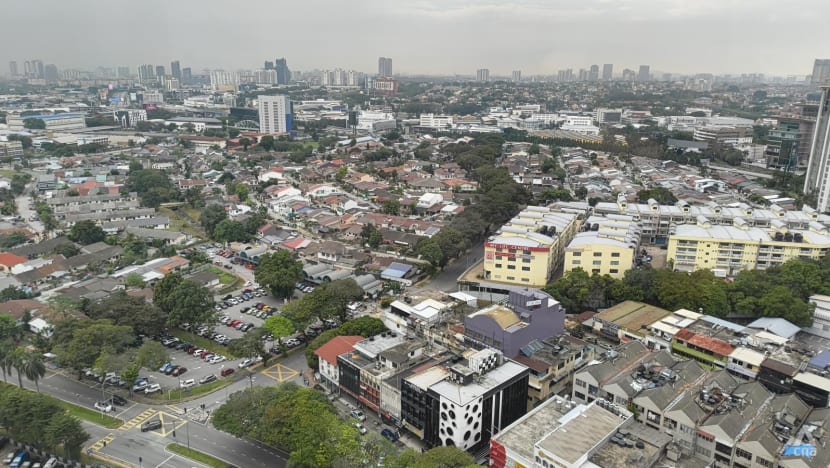Controversy over Malaysia’s proposed Urban Renewal Act: PM Anwar says Malay land rights won’t be affected
Opponents argue the proposed law oppresses underprivileged Malays in favour of property developers, and could force minority owners to give up their property rights.

Old flats in Taman Keramat in Kuala Lumpur, with condominiums being built in the background. (Photo: CNA/Fadza Ishak)

This audio is generated by an AI tool.
KUALA LUMPUR: As a fierce debate in Malaysia over a proposed urban renewal law takes on racial overtones, Prime Minister Anwar Ibrahim has said it will not alter the status of Malay reserve lands.
“If the land is Malay reserve land, it remains as Malay reserve land. If it belongs to the state government, it remains under the state. If it is privately owned strata land, it stays that way,” he was quoted as saying by news agency Bernama on Thursday (Feb 27) night.
He was responding to claims by Malaysia’s opposition coalition, especially the Parti Islam Se-Malaysia (PAS), that the proposed Urban Renewal Act would trample on the rights of certain quarters, especially that of Malays.
The Bill is due to be tabled in June or July this year, and opponents – which include the National House Buyers Association – argue it could displace vulnerable residents under the guise of gentrification and force minority owners to give up their property rights for redevelopment.
The Bill seeks to lower the threshold of consent for redevelopment projects from 100 per cent to 75 per cent for buildings over 30 years old, 80 per cent for buildings under 30 years old, and 51 per cent for abandoned buildings.
On Thursday, Anwar said that he would not allow people to continue living in cramped and deteriorating homes and would use his authority to provide better housing with improved facilities.
He cited the Seri Perlis flats in Kuala Lumpur that were built in the 1960s, saying the people living there were “among the poorest” and still residing in one-bedroom units.
“As prime minister and finance minister, should I just let that be? How can we develop without amending the law?” Anwar said at the closing ceremony of the Kedah Federal Village Development and Security Convention.

His remarks came a day after PAS Youth deputy chief Hafez Sabri said, without specifying a date, that the party would be organising a demonstration against the Bill.
Hafez has said the Bill oppresses underprivileged Malays in favour of property developers.
On Friday, Anwar said the opposition should take up more “sensible” issues and not exploit the right to organise peaceful assemblies.
"Don’t use this freedom (to assemble) to lie and slander in the name of Islam and Malay rights," he was quoted as saying by Free Malaysia Today when asked about the planned assembly.
“We want to help the Malays, but you are envious."
WHAT THE URBAN RENEWAL BILL IS ABOUT
The proposed law seeks to give a federal executive committee and state-level executive committees the power to redevelop and revitalise buildings or land parcels, or carry out regeneration projects on abandoned buildings, without having to get the unanimous approval of owners.
Under the Strata Titles Act 1985 – the law used presently – a management corporation may only undertake urban renewal works as a trustee with 100 per cent resolution of building owners.
Housing and local government minister Nga Kor Ming previously said the Urban Renewal Bill was necessary to replace outdated laws and regulations governing the redevelopment of dilapidated urban areas.

In July last year, Nga said 534 potential areas in peninsula Malaysia have been identified for urban renewal with an estimated gross development value of RM355.3 billion (US$79.6 billion).
Nga also said 139 of these areas, covering 3,206.5 acres, are located in Kuala Lumpur. They include old and dilapidated flats that have been deemed unsafe for occupation.
“In the most extreme cases, (buildings in) older parts of the city are abandoned, ‘sick’ and no longer sustainable. Yet, there is culturally and historically significant architecture worth preserving,” Nga was quoted as saying by Bernama.
Town and Country Planning Department (PLANMalaysia) director-general Dr Alias Rameli said the Bill adheres to 10 key principles that ensure government transparency and protects the rights of registered property owners.
"Among the core principles of the Bill are obtaining owners' consent, preserving original residents, safeguarding landowners' interests, and ensuring the fair alignment of maintenance costs,” he was quoted as saying by the News Straits Times in a statement on Feb 22.
"The Bill has been carefully drafted to serve the interests (of) and benefit the people, particularly communities and owners of dilapidated properties in urban areas.”

PUSHING OUT THE VULNERABLE, SAY OPPONENTS
The Bill has already been criticised by politicians and some property owners before its tabling in parliament.
Kubang Kerian MP Tuan Ibrahim Tuan Man, who is deputy president of PAS, argued that existing legislation was sufficient.
“There is no need to introduce a new law for development, what is more important is ensuring that urban demographics are not monopolised by a single race,” he said.
“Once this Act is passed, the affected areas will be redeveloped. Those who previously bought homes for over RM100,000 will not be able to afford to repurchase them at over RM500,000,” he added.
Claiming that a minister had said banks are available to provide loans, Tuan Ibrahim continued: “So the minister wants capitalists to monopolise the process. This is a subtle method to push out those who cannot afford it, particularly Malays and Indians.”
A significant number of property developers in Malaysia are led by ethnic Chinese, although Malays are the largest ethnic group in the country.
Tuan Ibrahim made his remarks, reported by news portal Malaysiakini, at a press conference on Feb 19.
His comments echo that of PAS Youth's Hafez, who said the Bill “will implicitly deny the voice of minorities, undermine socio-economic stability and oppress the rights of certain groups”.
In a statement on Feb 25, Hafez said: “This Bill is also seen to put pressure on urban residents, especially the Malay community who are less able. This new legal provision is found to favour developers who are interested in the name of urban renewal. Minorities will be oppressed. They will be forced to move out and surrender their land against their will.”
Another vocal opponent of the Bill is Chang Kim Loong, secretary-general of the National House Buyers Association.
The association, which advocates for homebuyers' rights, disagrees with the reduced consent threshold, and not the Bill or redevelopment in itself.
Speaking to CNA, Chang argued that the proposal to lower consent thresholds infringes on property rights protected under Article 13 of the Federal Constitution.
"This forces a minority of owners to relinquish their property rights against their will," he said, adding that he disagreed with the racial tones the debate has taken.
He further warned that while developers might offer a one-to-one unit exchange, the act could lead to gentrification and densification.
"Imagine a five-storey (block) with 200 owners being replaced by a high-rise with 3,000 owners on the same plot. Such densification would strain existing infrastructure beyond capacity," he said, adding traffic congestion would worsen.
NECESSARY, BUT HAVE SAFEGUARDS FOR EXISTING RESIDENTS: ANALYSTS
Those who support the proposed law say it is necessary.
A single dissenting owner can halt the redevelopment process, said Nischal Ranjinath Muniandy, a senior researcher at the Institute for Democracy and Economic Affairs (IDEAS) think tank.
He said the proposed consent threshold is on par with places like Singapore, where en bloc sales under the Land Titles (Strata) Act require majority consent of at least 80 per cent by share value and strata area for developments 10 years and older.
“This would encourage more redevelopment in the urban core. There is way too much development in the outer suburban areas," he told CNA.
"Redevelopment is crucial for revitalising historic city centres like Kuala Lumpur, Johor Bahru, and George Town (in Penang), which have been hollowed out by decades of pro-suburban policies."
The authorities can ensure the welfare of existing residents by having units valued by an independent valuer so that owners get fair market value, or providing a one-to-one replacement of their unit in the new development, he said.
Koh Cha Ly, the chief executive of Urbanmetry – a data analytics company focusing on urban development – said there are many vacant buildings in Malaysia, with over 100 in Kuala Lumpur alone.
Many of them are in a state of disrepair, she told CNA.
A single owner opposing the redevelopment of an unsafe building would be unfair to the majority, she argued. “Doesn’t this discount the rights of the other 99 (owners)? They also have the right to a safe and modern living space,” she said.
Koh said she supports having a diverse mix of residents in an area. “Most importantly, the (original) community (must not be) shortchanged," she said.


















